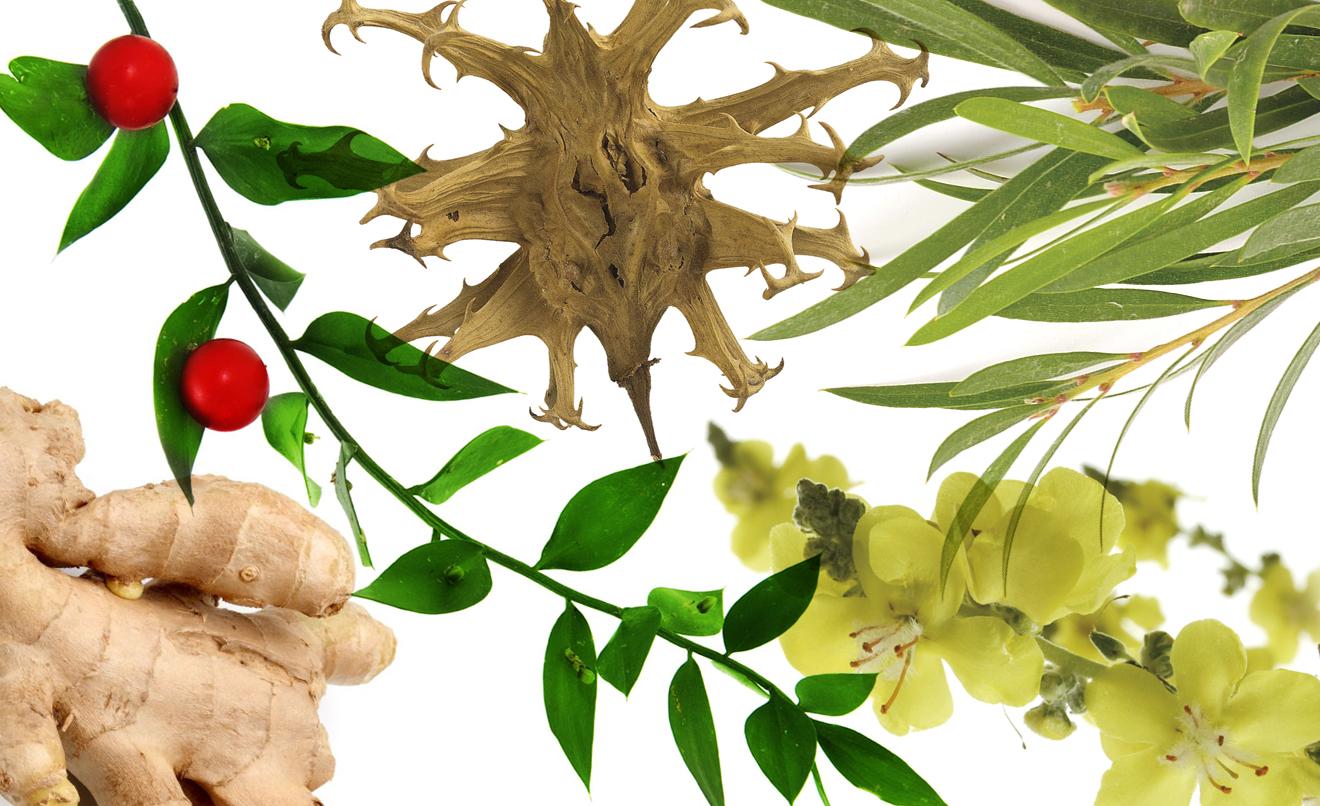
Ribwort plantain Plantago major L.
PROPERTIES: soothing
IN CASE OF: solar attacks
Ribwort plantain is distributed throughout Europe and North and Central Asia. Although it can be found anywhere in the world, it prefers temperate and cold climates. It grows in orchards, wetlands and meadows, among other areas. Ribwort plantain leaves have been traditionally used for their soothing, anti-inflammatory and antipruritic properties. The main constituents are mucilages, iridoids, phenolic acids, tannins and mineral salts. It helps combat skin irritation caused by excessive sunbathing.
Tea tree Melaleuca alternifolia
PROPIEDADES: antiseptic, antifungal, antiparasitic and disinfectant
IN CASE OF: fungus
It is a bush from Australia. It was there that the indigenous people began to use it to treat various skin and respiratory disorders. Tea tree essential oil helps fight fungus and athlete's foot, which are so prevalent during the summer due to the heat and humidity. In addition, it helps prevent infections and improves the healing of scars and superficial wounds.
Butcher's broom Ruscus aculeatus L.
PROPERTIES: venotonic, capillary protector and anti-inflammatory
IN CASE OF: tired legs
It is a plant native to the Mediterranean area in Europe and Africa. It appears in shady and humid places, and above all in calcareous terrain, forming part of the scrub. Butcher's broom is a medicinal plant widely used to relieve discomfort caused by poor venous circulation. It is considered the herbal remedy with the greatest action in this type of problems. The root and rhizome of the butcher's broom contain abundant saponins which, together with flavonoids, strengthen the walls of veins and capillaries, reducing inflammation and edema. It can be of great help during the summer, when warmer temperatures favor the dilation of the veins and thus worsen the return of blood, producing heaviness in the legs.
Mullein Verbascum Thapsus L.
PROPERTIES: antibacterial, anti-inflammatory and softening.
IN CASE OF: otitis
It is found in Europe and Western Asia and lives in warm, semi-warm and temperate climates. It grows on abandoned land and roadsides. Mullein contains abundant mucilage with beneficial properties to treat minor irritations of the external ear, mainly caused by the spread of bacteria on beaches and swimming pools that spread easily with the combination of water and heat.
Ginger Zingiber officinale
PROPERTIES: antiemetic and carminative.
IN CASE OF: nausea
Ginger is a plant native to tropical Asia that has been used as a medicinal plant in the West for at least 2,000 years. The mere fact of going on a trip is synonymous with a bad time, for many children and some adults, due to the dizziness caused by traveling by car and other vehicles. The well-known "traveler's motion sickness" or kinetosis, usually causes nausea and vomiting and occurs because the movement of vehicles causes the brain to not properly process the information it receives from hearing and sight. Ginger rhizome can be useful in these cases to prevent nausea and vomiting.
Passionflower Passiflora incarnata L.
PROPERTIES: sedante and antispasmodic
IN CASE OF: lack of sleep
Originally from America, it is found in tropical and subtropical regions. It is also found in some areas of the Mediterranean region. The active ingredients of passionflower have sedative properties of the nervous system, antispasmodic and muscle relaxants. It is used in case of nervousness, anxiety and sleep disturbances, very common in the summer season. The heat and the change in sleeping habits mean that, on many occasions, sleeping becomes an impossible mission in summer.
Devil's claw Harpagophytum procumbens DC
PROPERTIES: anti-inflammatory and analgesic
IN CASE OF: blows, bruises and bumps
It is native to southern Africa, where it grows especially on the red sand of the regions bordering the Kalahari desert, Namibia and the island of Madagascar. Devil's claw reduces and improves joint and muscle pain and, therefore, is very useful in summer when outdoor activities increase and, with them, the risk of suffering blows, bruises or joint injuries.
Green anise Pimpinella anisum L.
PROPERTIES: carminative, aperitive and digestive
IN CASE OF: bad digestion
It grows spontaneous in Egypt and the Middle East, and is grown in warm climate regions, mainly in Spain, Italy, North Africa and India. It blooms from June and the fruits are harvested to extract the seeds in July-August. Green anise improves digestion and helps prevent excessive gas formation. It can be of great help at this time when we change our eating habits that can cause bloating and other digestive disorders.
Cranberry Vaccinium macrocarpon Ait.
PROPERTIES: diuretic and antiseptic
IN CASE OF: Urinary infections
Native to the eastern part of North America, the cranberry plant is a small shrub that does not usually exceed two feet in height. It has diuretic, urinary antiseptic and astringent properties. It is very useful for treating and preventing urinary tract infections due to its content of proanthocyanidins, molecules that prevent the adhesion of microorganisms to the cells of the urinary tract. The diuretic properties are due to the action of flavonoids and help eliminate germs through urine.
Purple loosestrife Lythrum salicaria L.
PROPERTIES: astringent and antidiarrheal
IN CASE OF: diarrhea
It is common in humid places throughout Europe. In Spain it lives in the vicinity of streams and ditches at 100 meters of altitude. Purple loosestrife, due to its high tannin content, helps relieve diarrhea, which is very common in summer due to water changes and food poisoning. Its mucilages exert a demulcent and anti-inflammatory effect that helps calm the irritation of the intestinal mucosa.